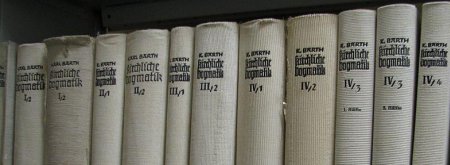Karl Barth and Natural Theology?
A few years ago, I organised what I hoped would be a debate on Islam. A leading British Muslim agreed to take part and debate with Professor Gary Habermas.
The Muslim agreed to promote the meeting and promised that many Muslims would attend. In the event, he came alone with his driver and seemingly no other Muslim attended. Gary Habermas spoke first and presented his well known arguments concerning the earliest evidence for Christianity, focussing on the historicity of Paul's creedal statement in 1 Corinthians 15:3-5. It was a powerful case, tracing the beliefs "of first importance", concerning Christ's death and resurrection, on sound documentary evidence back to within three to five years of the events themselves.
How would his opponent respond? Well, he didn't. He engaged with none of the issues and offered no arguments at all to support his views. He merely stated his Islamic beliefs, interspersed with such phrases as, "We are taught to believe this...", "We are told that...". No justification of these Koranic beliefs was made at any point. His presentation was entirely 'fideistic', that is, a statement of faith, unargued and unengaged with any contrary opinion. Personally, I found it shocking. This did not even follow the rules of polite conversation, where you respond to what the other person has just said. There was no exchange. It was as if Habermas had said nothing.
The Fideism of Karl Barth
However, fideism is not confined to Muslims. The greatest Protestant theologian of the twentieth-century adopted entirely this approach. Karl Barth did not believe in arguments or evidences to proclaim Christianity, and his influence persists strongly today. Such rational approaches to belief could in his view do nothing to facilitate a personal encounter with Christ. The evidence of nature and apologetic reasoning had no role in bringing people to faith.
In his view, such rational thought could only be of benefit for those who already believed in God, and such belief could only come about by God's revelation of himself. It cannot justify itself through external criteria. The argument he proposed went entirely one way – from God to the world and not from the world of human thought and experience towards God. Here is the antithesis of dialogue. God's revelation must be accepted by faith, unaided by reason, whether historical, scientific, cultural, moral, psychological or social. Such fields of discourse do not overlap at any point with Barthian biblical theology.
God has revealed himself in two books, Scripture and Nature
In so doing, Barth broke free from the long Christian tradition that God has revealed himself in two books, Scripture and Nature; in what he has said and in what he has done. Needless to say, his approach plays straight into the hands of the New Atheists, who keep asserting that faith is a blind leap, unrelated to evidence. Endorsing such a view leaves us with no stepping-stones in our common experience. We are left with a take-it-or-leave-it, undiscussable, theological imperialism, whose truth claims must be accepted uncritically, lock, stock and barrel. This leap of faith is, of course, the same for most cults and religions including Islam, whose beliefs are walled off from intellectual enquiry and justification.
It also plays into the hands of Relativists, who maintain that the truth they have found is their personal truth: "it is true for me". Keith Ward has written that adding those two words "for me" is "a central heresy of our culture".[1] It is the ultimate denial of 'public truth', that reality which is objectively true for everyone, whether or not you believe it. And it plays into the hands of those for whom subjective experience is the final arbiter of truth, leaving them at the mercy of another experience. Such theology is undiscussable and loses all pretensions to be an academic discipline, with a rightful place in university life.[2]
Barth's Historical Context
Barth's approach was certainly extreme but, not surprisingly, it had an historical context. Barth was born in 1886 and was initially trained in Protestant Liberalism. He came to see that this human-centred approach to theology was too deeply immersed in German culture and he countered it in his preaching by emphasising Christ-centred, biblical theology. Matters came to a head when his former university teachers declared their support for German warmongering under Kaiser Bill.
The subsequent rise of Nazism between the wars led Barth to draw up the Barmen Declaration of the Confessing Church in 1934, which said:[3]
We reject the false doctrine, as though the Church could and would have to acknowledge as a source of its proclamation, apart from and besides this one Word of God, still other events and powers, figures and truths, as God's revelation ... as though there were areas of our life in which we would not belong to Jesus Christ ... as though the Church were permitted to abandon the form of its message ... to changes in prevailing ideological and political convictions.
These were certainly heady days. An extreme theology came out of extreme circumstances! Natural theology, being linked with German national volk-religion, was set against the revealed religion of Christ in Scripture, and Barth's theology became all the more extreme in its defence. His biblical theology became isolated from rationality, presupposing its own truth, which needed no justification. He maintained that God in his sovereignty makes himself knowable. Man in his sinfulness cannot otherwise obtain any knowledge of God. A great gulf is fixed, bridged only by God in disclosing himself in Christ through the work of the Holy Spirit. Such knowledge is entirely a work of grace, unaided by human intellect.
Responding to Fideism
What then can one say in response to such biblical fideism? Well, you could say it is self-defeating, as it denies rational justification for its beliefs. Why should anyone believe it? As rational beings, we demand rational justification for what we believe. It is essential to our humanity, a God-like property marking us out from other animals.
As rational beings, we demand rational justification for what we believe. It is essential to our humanity...
We might also say that it is particularly attractive to the intellectually lazy or timid, who cannot be bothered to answer people's rational objections to faith. Such fragility is common. People justify their belief in Christ through their belief in the Bible, and justify their belief in the Bible through Christ's teaching. The argument is entirely circular and closed off against further debate. Evangelism is made easy, believing that only God can open blind eyes and that we have no role in this. We can 'tell' others about the Gospel, and if they don't grasp it, we can only tell them again, perhaps more loudly. This may be a caricature of what happens but, I suggest, it is close enough to the truth to be immediately recognisable. For many orthodox Christians, it justifies a 'simple proclamation' approach to evangelism, devoid of any need to persuade.
Is it Biblical?
More importantly, however, and somewhat ironically, we must accuse Barth of being unbiblical! The scriptures themselves testify to the validity of man's rationality and they encourage rational thought about the world we live in. They assert there is a knowledge of God to be found in observing nature. "Come, let us reason together, says the Lord" (Isaiah 1:18).
So the Psalmist tells us that:
The heavens declare the glory of God and the sky above proclaims his handiwork...their voice goes out through all the earth, their words to the end of the world (Psalms 19:1,4)
The apostle Paul quotes this verse in his letter to the Romans:
So faith comes by hearing and hearing through the word of Christ. But I ask, have they not heard? Indeed they have, for 'Their voice has gone out to all the earth, and their words to the ends of the world' (Romans 10:17-18)
In other words, the glory of God can be seen through what he has made, and that declaration is made to everyone. Again in Psalms 8 and 104, the writers say that when they look at the work of God's hands, they draw theological conclusions about the majesty of God and the dominion of man over God's abundant provision in nature.
This surely must have been in Paul's thinking when he wrote that what can be known about God is plain even to sinful men, who suppress the truth by their wickedness:
For what can be known about God is plain to them, because God has shown it to them. For his invisible attributes, namely his eternal power and divine nature, have been clearly perceived, ever since the creation of the world, in the things that have been made. So they are without excuse. For although they knew God, they did not honour him as God or give thanks to him, but they became futile in their thinking and their foolish hearts were darkened. (Romans 1:21)
Here surely is a very clear mandate for appealing to what is called 'general revelation' or 'natural theology'. And if this were not true, how would Old Testament figures such as Abraham have ever believed in God, such that they recognised his call, long before any Scriptures were written?
Preaching to Pagans
This testimony in nature is used by Paul in his evangelistic preaching to the pagan farmers at Lystra:
You should turn from these vain things to a living God, who made heaven and earth and the sea and all that is in them. In past generations, he allowed all nations to walk their own ways. Yet he did not leave himself without witness, for he did good by giving you rains from heaven and fruitful seasons, satisfying your hearts with food and gladness. (Acts 14:15-17)
Here Paul appeals to the ordering of nature and its generous provision, which should have been seen for what it was, causing people to give thanks to their Creator, on whom they were dependent. He takes up this theme again with the philosophers at Athens:
What you worship as unknown, this I proclaim to you. The God who made the world and everything in it, being Lord of heaven and earth ... gives to all mankind life and breath and everything ... that they should seek God, in the hope that they might feel their way toward him and find him. (Acts 17:23-27)
He then appeals to their own natures:
Being then God's offspring, we ought not to think that the divine being is like gold or silver or stone, an image formed by the art and imagination of man. The times of ignorance God overlooked but now he commands all people everywhere to repent... (Acts 17:29-30)
It seems from this call to "all people everywhere" to repent, that God holds people culpable, even if they have never heard the Gospel. There are essential truths about God revealed in nature, both in its ordering and provision, and also in their own natures. They are clearly mysteriously and wonderfully different from inanimate objects – which they call Gods. Big mistake! The clues are there, says Paul.
There are essential truths about God revealed in nature ... and also in [our] own natures.
Perhaps Paul was thinking here about their capacity to reflect and understand, their rationality and ability to recognise order in the created world, or their appreciation of art and beauty. But another feature which should certainly have alerted them was their moral awareness:
For when the Gentiles, who do not have the law, by nature do what the law requires ... they show that the work of the law is written on their hearts, while their conscience also bears witness, and their conflicting thoughts accuse or even excuse them ... when God judges the secrets of men by Jesus Christ. (Romans 2:14-16)
They know the difference between right and wrong. Human beings were not left in total ignorance until they have the Gospel proclaimed to them. They have something substantial to work on. This should stir their souls and cause them to seek after God.
The Honest Seeker
Paul's reference to seeking is surely significant. God's revelation in nature, as elsewhere in Scripture, is clear yet subtle. It is not 'in your face'. Jesus himself spoke in parables which could be taken at face value or provoke deep questioning. He spoke of those who have eyes to see and ears to hear, implying that many would see and hear but not understand. He told them to be careful how they listen (Luke 8:9-10,18).
He seemed particularly reticent about his own identity, commanding people in the early part of his ministry not to tell others. His teaching method was to provoke interest and draw people in, allowing others the freedom to walk away. The evidence from nature has a similar ambiguity. We can superficially say, "How lovely!" but fail to see its implications.
The Evidence of History
Again, Scripture is explicit about the importance of historical evidence. Luke starts his Gospel with an emphatic claim to be providing reliable historical details. Having followed the story closely, drawing on earlier narratives and eye-witness reports, he sets out to write an orderly account, so that Theophilus might have certainty about the things he had been told.
Paul spells out the historical details of his conversion and of his subsequent reporting to Peter and James, putting himself on oath for his statements (Galatians 1:20). In 1 Corinthians 15 he lists the eye-witnesses of the resurrection and goes on to say that if this historical event is untrue, not only is their preaching in vain but they have misrepresented God, "because we testified about God that he raised Christ, whom he did not raise" (1 Corinthians 15:14-15). In fact, this whole passage is a well-argued case, appealing to the rationality of those who doubt it.
The argument the apostles presented was a linear one from historical events in the world to the Lordship of Christ
Matthew records that Christ taught that we should love God with all our minds, as well as our hearts and souls (Matthew 22:37). John says that Thomas was invited by Jesus to test the evidence and refers to Christ's miracles as evidential 'signs' so that his disciples might believe that he is the Christ (John 20:27-31). Luke says that Jesus, after his suffering, showed himself to his apostles and "gave many convincing proofs that he was alive" (Acts 1:3). Jesus, however, warned in the story of Dives and Lazarus, that even that truth can be ignored (though not safely ignored) by those who wish to ignore it (Luke 16:31).
The argument the apostles presented, then, was a linear one from historical events in the world to the Lordship of Christ, and not a circular argument requiring a prior commitment to belief in God and the witness of Scripture. As Martin Kahler has put it: "We do not believe in Christ because we believe in the Bible; we believe in the Bible because we believe in Christ."[4]
How far does it go?
How then does 'natural theology' work? It appeals to human nature and the capacity for rational thought and reflection that marks us out from the rest of the animal kingdom. It is fundamental to our nature to ask questions – and life poses many of them. Certainly, some people take life for granted and ask no deeper questions about it. And if I understand Paul's letter to the Romans correctly, that seems to be a moral choice for which people will be held responsible. The lazy, the wicked, the pleasure seekers, the arrogant and the ungrateful will be held to account because God has made himself known through what he has made.
But does natural theology leave us with a remote, deist God who is detached and disinterested in the creation he has set in motion? The great mysteries of life provide a challenge, and both Paul and Jesus encourage the honest seeker to draw close to God. In the Sermon on the Mount, Jesus said:
Ask and it will be given to you, seek and you will find, knock and it will be opened to you. For everyone who asks receives, and the one who seeks finds, and to the one who knocks it will be opened. (Matthew 7:7-8)
This challenge to ask, seek and knock is given to everyone by the very fact of their existence and the realities of the world around them, which cry out for explanation. These realities bring us to an awareness of our creator and raise questions for us as to how we should live.
Asking and seeking speak both to our relationship to God and our disposition towards the world around us. Knocking implies active engagement in exploring the world. At the simplest level, this could mean behaviour like the Bereans who "were more noble-minded than the Thessalonians ... for they examined the Scriptures daily to see if what Paul said was true" (Acts 17:11). At the most sophisticated level, it may mean building the Large Hadron Collider to explore particle physics! Augustine's great realisation, born out in Christian experience down the centuries, was that our hearts are restless, until they find their rest in God.
Preparatory Work
So the world tells us about God, but on its own, it only tells us so much. Its existence speaks of the need for a transcendent creator. Its finite character, seen both through the expansion of the universe from a singularity in the past and the second law of thermodynamics telling us that it is slowly running down, speaks of its beginning at a point in time and its predictable end. The remarkable fine-tuning of the universe speaks strongly of an intelligent designer and the moral awareness that is provoked by our choices tells us that our deeds matter. The beauty of the world and our need for a sense of purpose testify to the intentionality of it all and convince us that this is no random, chance existence. Natural theology is disturbing and preparatory, teaching us fundamental truths about God, who then discloses himself in Christ to those who honestly seek him.
The Great Intender?
So who is this creator, designer, intender and moral force, who presses his existence upon us? We might begin to explore all the religious ideas the world has ever produced and see if any of them are coherent, credible and satisfying. But it doesn't take long to discover that Christ is in a league of his own. There is no comparable figure in all recorded history.
Here, at last, in the crucified Christ we see the human face of God, revealed to all who honestly and humbly seek the truth
And yet Christ himself draws us on. He speaks in parables, he strips us of our illusions, he throws us back on ourselves and confronts us with our own duplicity and wickedness. He describes himself as the Son of Man, a deliberately ambiguous title. Like a somewhat familiar stranger at a party, the guests struggle to identify him. This "Son of Man came to seek and to save the lost" (Luke 19:10). He stills a storm, raising the question, "Who then is this that even the wind and the sea obey him?" (Mark 4:41). He claims authority to forgive sins against God and gives evidence of it by healing a paralysed man. He says he is the Lord of God's Sabbath. He predicts that the Son of Man must suffer many things and be rejected by men. Then on the cross, he enters the depths of human suffering brought on by human wickedness, and offers his life in exchange for ours – "for the Son of Man came not to be served but to serve and to give his life as a ransom for many" (Mark 10:45). Here, at last, in the crucified Christ we see the human face of God, revealed to all who honestly and humbly seek the truth. And then he bursts from the tomb in glorious triumph.
Inference to the Best Explanation
So 'natural theology' can only take us so far, but it does point to fundamental realities of our existence and provides a cumulative argument, while exposing the vacuum at the heart of human experience, the nihilism of a world without meaning or value. It points to the balance of probabilities and an inference to the best explanation.
This should turn us all into seekers, and if Jesus is to be trusted, the honest seeker will always find. Even then, such a transforming encounter with Christ does not demolish all our doubts. Faith and doubt then go hand in hand. New doubts and new certainties progress together. We live by faith (trust), not by final certainty, but we have here the very best account for our extraordinary existence.
We have received an entirely credible invitation to the Great Banquet in the Kingdom of God. We have good grounds for believing it. We 'dress' for the occasion by reforming our behaviour. We set out on the journey in anticipation, not with final certainty, but with a real and confident hope. For only when we arrive at our destination will we finally be sure. As Paul wrote, "For now I know in part; then I shall know fully, even as I am fully known" (1 Corinthians 13:12).
The Final Step
November 2013 saw the 50th anniversary of the death of C.S. Lewis, whose search is well documented. The major step forward for him after years of intellectual struggle was the realisation that God must actually exist.
When an individual cries out to God, God makes himself known
His step from atheism to theism was a huge stride, but the step to then acknowledge that God has revealed himself in Christ, was but a short shuffle. Around his memorial stone in Poets' Corner in Westminster Abbey is his famous observation, "I believe in Christianity as I believe that the sun has risen; not only because I see it but because by it I see everything else."
When an individual cries out to God, God makes himself known. Or as the writer of Hebrews put it, "Whoever would draw near to God must believe that he exists and that he rewards those who seek him" (Hebrews 11:6). From the dawn of time was ever thus.
References
[1] Keith Ward, The Turn of the Tide (BBC, 1986), p.144.
[2] See Rodney Holder, The Heavens Declare (Templeton Press, 2012), p.102 quoting Wolfhart Pannenberg.
[3] As quoted by Eric Metaxas, Bonhoeffer (Thomas Nelson, 2010), p.224f.
[4] Quoted in William Lane Craig & Joseph E. Gorra, A Reasonable Response (Moody Publishers, 2013), p.107.
© 2014 Peter May



